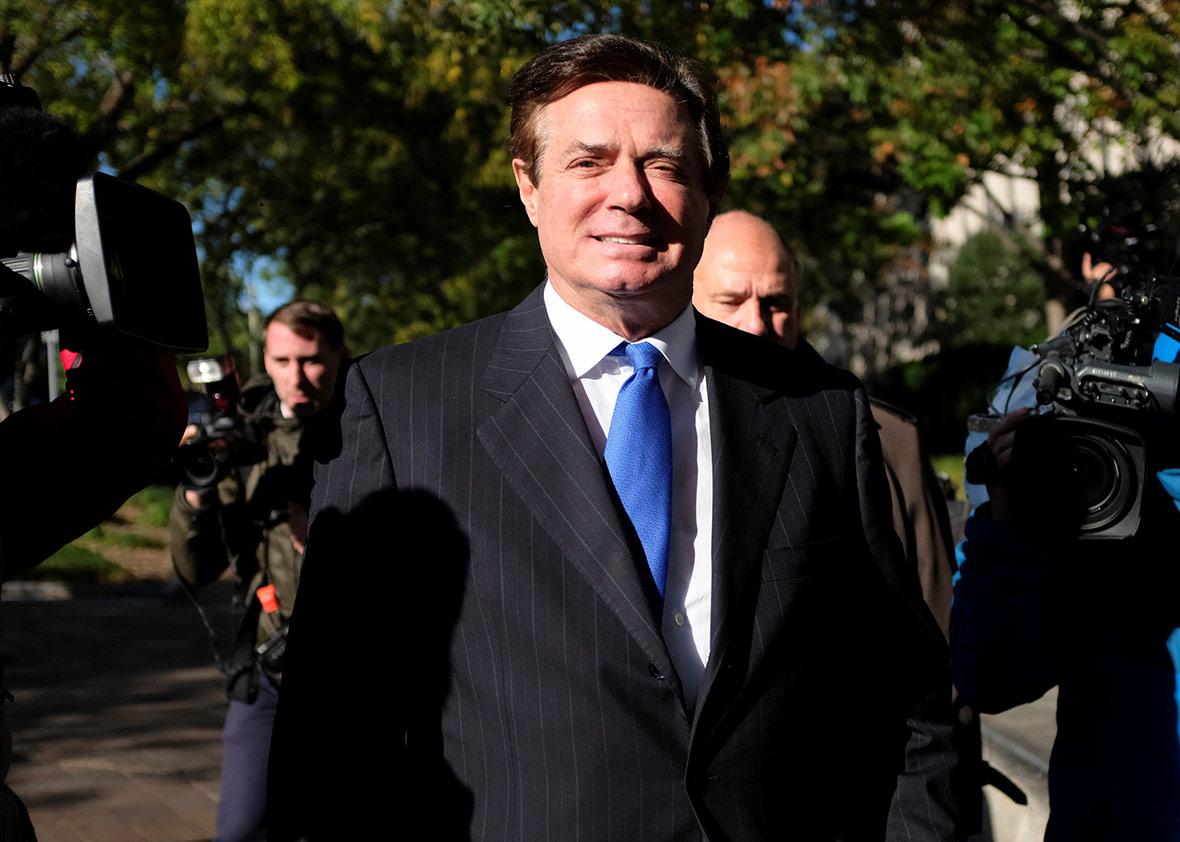Citizens—law students, journalists, a father showing his sons the ropes of the justice system—started lining up at around 9 a.m. outside the upstairs courtroom in the E. Barrett Prettyman U.S. Courthouse, five hours before the initial hearing for former Trump campaign manager Paul Manafort Jr. and his associate Richard Gates III. This snaking line of humanity felt like the lone noteworthy twist on an old-fashioned American ritual, one housed safely within wood-paneled walls and beneath the dim gleam of a huge national seal. The classic, boring, serious operations of our legal apparatus had begun clanking into motion as security guards patrolled the pews, instructing spectators to turn off their phones. (Yes, all the way off. That means you, miss. I see you. I can still see you. OK, please come with me.) This was all very normal: the whispering mass of suits near the bench, the defendants being escorted in, those of us in the gallery rising to our feet to greet the judge.
What followed, after we took our seats, was aggressively mundane and studiously formal, the kind of ceremony that contains prescriptive details but no narrative power. The attorneys and Judge Deborah Robinson did the talking. The day’s cartoon villains, Manafort and Gates (the former of whom spent nearly $1 million on Persian rugs, like something Marie Antoinette might do if she happened to be a Russian spy), probably said a combined 10 words, all of them to the tune of “yes” and “I do, your honor.” The supporting actors in this undramatic courtroom drama shuffled papers, established which branch of pretrial services would monitor which defendant, ironed out conditions of release, and signed forms. Meanwhile, the alleged criminals barely registered as present, let alone furious or terrified or guilty or righteous. The legal machinery had effaced them. They stared impassively ahead and seemed committed to the quixotic goal of eliminating their own body language.
Toward the beginning of the proceedings, special counsel Robert Mueller’s lawyers said Manafort and Gates both presented a “risk of flight” due to the seriousness of the charges and the strength of the evidence condemning them. In his response, Manafort’s attorney Kevin Downing claimed the defense “resented” the state’s insinuations. The man sitting next to me, a veteran of the attorney general’s office, explained that this was pure performance: Most hearings open with a grandstanding prosecutorial declaration about the merits of their case and a rhyming assertion from the defense that challenges the other team’s hubris. It reminded me of ritualized dialogue in epic poetry, the pre-fight banter that heroes engage in to contain the battle’s violence and to impose a measure of order on chaos.
The hearing did feature one moment of strangeness, a glitch in the smoothly running traditions that almost broke Judge Robinson’s sanctuary apart. When she asked Downing for Manafort’s plea, he said, incredibly, “There is no plea.” It was a jolt of surreality—how could there be no plea? What did that even mean?—something akin to the counsel averring that “there is no sky.” But then Downing clarified. “The plea is not guilty to all of the charges,” he said. The sky clicked back into place.
Given the almost total absence of story elements to latch on to, we were left to divine some trace of character from the tone of the men’s voices. Manafort’s “I do” when the judge asked him whether he understood his instructions—to report to pretrial services for orientation the next morning; to remain in his home except for court appearances, religious services, medical appointments, and attorney meetings; to surrender his passport; to post a $10 million bond—was low, mild, and gravelly, effortfully purged of what must have been his deep humiliation. Gates, whose bail was set at $5 million, sounded clipped and professional, as though we were all wasting his time. But for the most part, the themes at Monday’s hearing were logistical, rather than novelistic, and were easily resolved: Could lawyer Kevin Downing confirm his client’s address? (Yes.) Would Gates have to reimburse the public defenders’ office for his district-appointed counsel since he had the means and the notice to hire a private attorney? (Probably.) When would the pair next appear in court? (On Friday, Nov. 3, at 2 p.m.)
It fell to us, the audience, to supply suspense and melodrama. We mostly accomplished this by not putting away our phones as requested. A beleaguered team of security guards issued increasingly dire growls before finally threatening to eject people by force. One woman huffed that her boss was texting her. The officer replied in a doom-laden voice: “You were FOREWARNED.” The contrast between the shambolic grotesquerie of the news likely to appear on our devices and the enforced decorum of the chamber felt like a metaphor. Beyond regulations and privacy concerns, I understood why the guards wanted the smartphones off.
A courtroom is a place you can go to access the analgesia of precise numbers. When I walked in, I was thinking about the moral and spiritual repercussions of conspiracy against the United States of America. But when the prosecutors opened their mouths, there was no howl of anguish for our conned country or confusion at the wildness of the news or glee at the comeuppance of the malfeasant. For each defendant, the state recommended a jail sentence comically and fussily commensurate with his exact crime: Manafort faces 151 to 181 months of imprisonment; Gates faces 121 to 151. None of those figures are even divisible by 12! At a time when many of us can’t figure out how to articulate what our politics have become, the Justice Department has cracked that riddle and declared that its answer is equivalent to approximately 4,530 days in a jumpsuit. It is marvelous.
